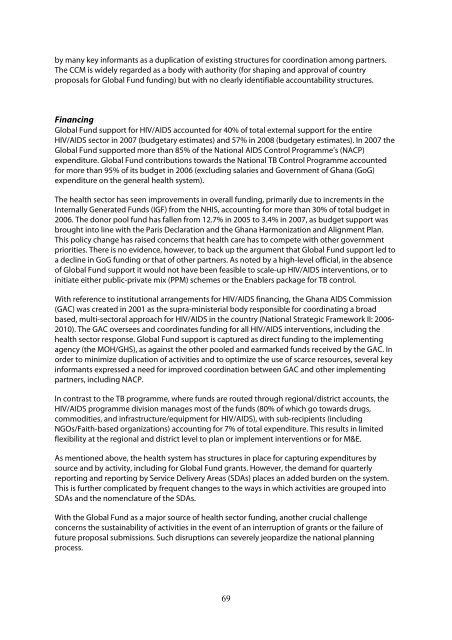MAXIMIZING POSITIVE SYNERGIES - World Health Organization
MAXIMIZING POSITIVE SYNERGIES - World Health Organization
MAXIMIZING POSITIVE SYNERGIES - World Health Organization
You also want an ePaper? Increase the reach of your titles
YUMPU automatically turns print PDFs into web optimized ePapers that Google loves.
y many key informants as a duplication of existing structures for coordination among partners.<br />
The CCM is widely regarded as a body with authority (for shaping and approval of country<br />
proposals for Global Fund funding) but with no clearly identifiable accountability structures.<br />
Financing<br />
Global Fund support for HIV/AIDS accounted for 40% of total external support for the entire<br />
HIV/AIDS sector in 2007 (budgetary estimates) and 57% in 2008 (budgetary estimates). In 2007 the<br />
Global Fund supported more than 85% of the National AIDS Control Programme’s (NACP)<br />
expenditure. Global Fund contributions towards the National TB Control Programme accounted<br />
for more than 95% of its budget in 2006 (excluding salaries and Government of Ghana (GoG)<br />
expenditure on the general health system).<br />
The health sector has seen improvements in overall funding, primarily due to increments in the<br />
Internally Generated Funds (IGF) from the NHIS, accounting for more than 30% of total budget in<br />
2006. The donor pool fund has fallen from 12.7% in 2005 to 3.4% in 2007, as budget support was<br />
brought into line with the Paris Declaration and the Ghana Harmonization and Alignment Plan.<br />
This policy change has raised concerns that health care has to compete with other government<br />
priorities. There is no evidence, however, to back up the argument that Global Fund support led to<br />
a decline in GoG funding or that of other partners. As noted by a high-level official, in the absence<br />
of Global Fund support it would not have been feasible to scale-up HIV/AIDS interventions, or to<br />
initiate either public-private mix (PPM) schemes or the Enablers package for TB control.<br />
With reference to institutional arrangements for HIV/AIDS financing, the Ghana AIDS Commission<br />
(GAC) was created in 2001 as the supra-ministerial body responsible for coordinating a broad<br />
based, multi-sectoral approach for HIV/AIDS in the country (National Strategic Framework II: 2006-<br />
2010). The GAC oversees and coordinates funding for all HIV/AIDS interventions, including the<br />
health sector response. Global Fund support is captured as direct funding to the implementing<br />
agency (the MOH/GHS), as against the other pooled and earmarked funds received by the GAC. In<br />
order to minimize duplication of activities and to optimize the use of scarce resources, several key<br />
informants expressed a need for improved coordination between GAC and other implementing<br />
partners, including NACP.<br />
In contrast to the TB programme, where funds are routed through regional/district accounts, the<br />
HIV/AIDS programme division manages most of the funds (80% of which go towards drugs,<br />
commodities, and infrastructure/equipment for HIV/AIDS), with sub-recipients (including<br />
NGOs/Faith-based organizations) accounting for 7% of total expenditure. This results in limited<br />
flexibility at the regional and district level to plan or implement interventions or for M&E.<br />
As mentioned above, the health system has structures in place for capturing expenditures by<br />
source and by activity, including for Global Fund grants. However, the demand for quarterly<br />
reporting and reporting by Service Delivery Areas (SDAs) places an added burden on the system.<br />
This is further complicated by frequent changes to the ways in which activities are grouped into<br />
SDAs and the nomenclature of the SDAs.<br />
With the Global Fund as a major source of health sector funding, another crucial challenge<br />
concerns the sustainability of activities in the event of an interruption of grants or the failure of<br />
future proposal submissions. Such disruptions can severely jeopardize the national planning<br />
process.<br />
69

















